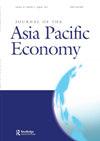Social networks and earnings differential of internal migrants in Indonesia: a switching regression
IF 1.5
4区 经济学
Q3 ECONOMICS
引用次数: 0
Abstract
AbstractThis study examines the earnings differential between users and non-users of networks of Indonesian internal migrants. By exploiting the Indonesian Family Life Survey wave 5, we employ endogenous switching regression to handle the self-selection bias in the model. We find evidence that the inherent characteristics of the migrants create a tremendous earnings gap between the two agents. Users of networks experience a wage penalty compared to non-users of network. We also find that education has a dominant impact on increasing the earnings discrepancy for migrants. These suggest that network users find it difficult to catch up on the earnings of their non-user counterparts. In addition, the study reveals that networks are not necessarily the only influencing factor of earnings differential. Moreover, the study specifically suggests that hiring channel through networks supports migrants in securing employment. However, the low education levels of the migrants restrict them from enjoying higher earnings.Keywords: Social networksearnings differentialinternal migrantswitching regressionJEL CLASSIFICATION: J01J31J61 Disclosure statementNo potential conflict of interest was reported by the authors.Additional informationNotes on contributorsSiti ParhahSiti Parhah is a lecturer and researcher at the Department of Economic Education, Universitas Pendidikan Indonesia (Indonesia University of Education). She earned her bachelor degree in Economic Education from Universitas Pendidikan Indonesia (2003), a Master degree in Economics from Universitas Indonesia (2006) and a Ph.D in Economics from Universitas Padjadjaran, Indonesia (2020).Armida S. AlisjahbanaArmida Salsiah Alisjahbana was appointed Under-Secretary-General of the United Nations and Executive Secretary of the Economic and Social Commission for Asia and the Pacific (ESCAP) on 13 September 2018. Prior to joining ESCAP, Ms. Alisjahbana was Professor of Economics at Universitas Padjadjaran in Bandung, Indonesia, a position she assumed in 2005.Mohamad FahmiMohamad Fahmi is a lecturer and researcher at the Department of Economics, Universitas Padjadjaran. Fahmi earned his bachelor degree in Economics from Universitas Padjadjaran, Indonesia (1997), a Masters degree in Industrial Economics from ITB, Indonesia (2002), and a Ph.D in Economics of Education from La Trobe University, Australia (2010).Raden Muhamad PurnagunawanRaden Muhamad Purnagunawan is a Senior lecturer and researcher at the Department of Economics, Universitas Padjadjaran. Purnagunawan earned his bachelor degree in Economics from Universitas Padjadjaran, Indonesia (2007), a Masters degree in Industrial Management from ITB, Indonesia (2001), and a Ph.D in Economics from Australian National University, Australia (2011).印尼国内移民的社会网络与收入差异:一个转换回归
摘要本研究探讨印尼内部移民网路使用者与非使用者的收入差异。通过利用印度尼西亚家庭生活调查第5波,我们采用内生转换回归来处理模型中的自我选择偏差。我们发现有证据表明,移民的固有特征造成了两个中介之间巨大的收入差距。与非网络用户相比,网络用户经历了工资惩罚。我们还发现,教育对农民工收入差距的扩大具有主导作用。这表明,网络用户发现很难赶上非用户的收入。此外,研究表明,网络不一定是收入差异的唯一影响因素。此外,该研究特别表明,通过网络的招聘渠道有助于移民获得就业。然而,农民工的低教育水平限制了他们享受更高的收入。关键词:社会网络搜索差异内部迁移转换回归分类:J01J31J61披露声明作者未报告潜在利益冲突。作者简介:siti Parhah siti Parhah是印度尼西亚教育大学(Universitas Pendidikan Indonesia)经济教育系讲师和研究员。她于2003年在印度尼西亚潘迪迪肯大学获得经济教育学士学位,2006年在印度尼西亚大学获得经济学硕士学位,并于2020年在印度尼西亚Padjadjaran大学获得经济学博士学位。阿米达·萨利西亚·阿里沙赫巴纳于2018年9月13日被任命为联合国副秘书长兼亚洲及太平洋经济社会委员会(亚太经社会)执行秘书。在加入亚太经社会之前,Alisjahbana女士于2005年担任印度尼西亚万隆Padjadjaran大学经济学教授。穆罕默德·法赫米是帕贾贾兰大学经济系的讲师和研究员。Fahmi于1997年在印度尼西亚帕德贾兰大学(Universitas Padjadjaran)获得经济学学士学位,2002年在印度尼西亚ITB获得工业经济学硕士学位,2010年在澳大利亚拉筹伯大学(La Trobe University)获得教育经济学博士学位。Raden Muhamad Purnagunawan是Padjadjaran大学经济系的高级讲师和研究员。Purnagunawan先生于2007年在印度尼西亚Padjadjaran大学获得经济学学士学位,2001年在印度尼西亚ITB获得工业管理硕士学位,2011年在澳大利亚国立大学获得经济学博士学位。
本文章由计算机程序翻译,如有差异,请以英文原文为准。
求助全文
约1分钟内获得全文
求助全文
来源期刊

Journal of the Asia Pacific Economy
ECONOMICS-
CiteScore
3.70
自引率
7.10%
发文量
58
期刊介绍:
Journal of the Asia Pacific Economy (JAPE) is concerned primarily with the developing economies within Pacific Asia and South Asia. It aims to promote greater understanding of the complex factors that have influenced and continue to shape the transformation of the diverse economies in this region. Studies on developed countries will be considered only if they have implications for the developing countries in the region. The journal''s editorial policy is to maintain a sound balance between theoretical and empirical studies. JAPE publishes research papers in economics but also welcomes papers that deal with economic issues using a multi-disciplinary approach. Submissions may range from overviews spanning the region or parts of it, to papers with a detailed focus on particular issues facing individual countries. JAPE has a broad readership, which makes papers concerned with narrow and detailed technical matters inappropriate for inclusion. In addition, papers should not be simply one more application of a formal model or statistical technique used elsewhere. Authors should note that discussion of results must make sense intuitively, and relate to the institutional and historical context of the geographic area analyzed. We particularly ask authors to spell out the practical policy implications of their findings for governments and business. In addition to articles, JAPE publishes short notes, comments and book reviews. From time to time, it also publishes special issues on matters of great importance to economies in the Asia Pacific area.
 求助内容:
求助内容: 应助结果提醒方式:
应助结果提醒方式:


